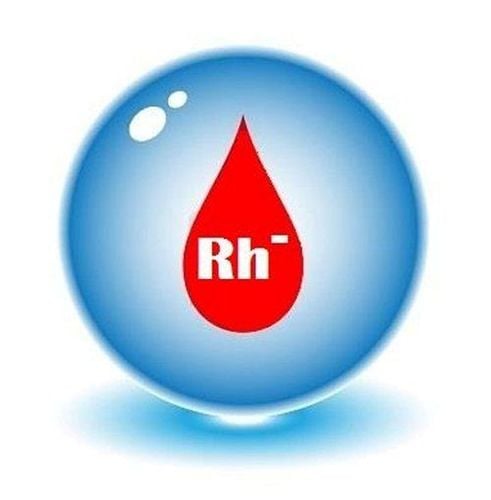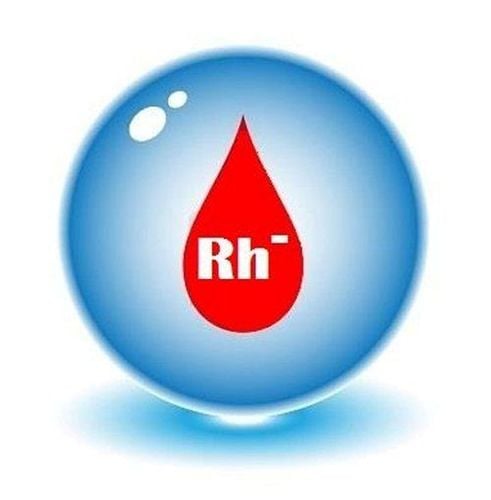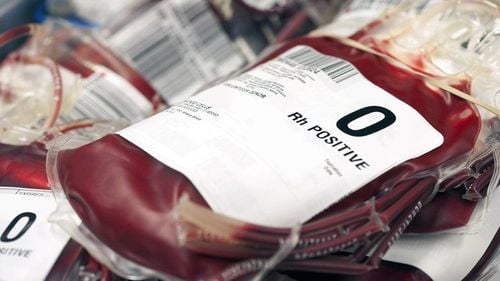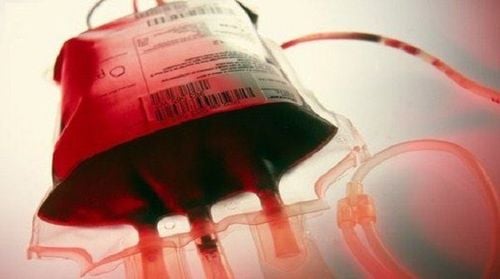This is an automatically translated article.
The article was professionally consulted by Dr. Nguyen Anh Tu - Doctor of Obstetric Ultrasound - Prenatal Diagnosis - Obstetrics Department - Vinmec Hai Phong International General Hospital.Mother-child blood group incompatibility or Rh incompatibility is a phenomenon that occurs when a mother has Rh negative blood group but carries a child with Rh positive blood group, this leads to hemolysis - a condition in which serious to the unborn baby if left untreated.
1. What is Rh incompatibility?
Each person's blood has either Rh positive or Rh negative factors. Rh factor - Rhesus is a special antigen or protein on the surface of red blood cells. Each person's genetic system is inherited from their father and mother, including the Rh antigen and this helps determine each person's blood type.
Majority of the population is Rh positive (Rh+) - Present in 85% of the population and the remaining 15% of the population do not have the D antigens, some of whom will be Rh- carriers. Rh incompatibility occurs when a woman with Rh- blood type becomes pregnant with a baby with Rh+ blood type. Rhesus disease, also known as hemolytic disease of the newborn, is a complication that can occur when the mother's body produces antibodies against the fetus's Rh+ red blood cells.

2. Signs to recognize Rh . blood group incompatibility
Signs of Rh incompatibility in the fetus can range from mild to severe - potentially life-threatening.
During labor, blood cells from the fetus pass through the mother's bloodstream and at this time, the mother's immune system creates antibodies against the baby's red blood cells. The cause comes from the fact that the mother has Rh- and the baby has Rh+, the mother's immune system defaults to seeing it as a foreign object that needs to be eliminated. And this puts the baby at greater risk of hemolytic disease. This is a serious condition that requires early intervention and medical treatment.
Your baby may show some of the following signs if the level of bilirubin (a chemical produced by the breakdown of red blood cells) in the baby's body is high after birth:
Jaundice Coma Reduced muscle tone. These signs will gradually decrease when the newborn is treated for Rh incompatibility.
3. What if there is Rh incompatibility between mother and child?
When a mother with Rh- blood type marries a husband with Rh+ blood type, the husband can carry one Rh+ and one Rh-. Since the Rh+ antigen in the husband's body predominates, the blood group is classified as Rh+. The children of these people will have a 50:50 ratio of Rh+ and Rh- blood types. But if the husband has both Rh+ genes, all the children will be Rh+. In this case, problems will arise:
First pregnancy: During labor, the blood of the mother and the fetus mix. At this time, the mother's body first encounters the Rh factor from the fetus, the mother's immune system will consider it as an antigen that needs to produce antibodies to fight the Rh factor; In the next pregnancy: In this case, if the fetus still has the Rh + group, then the re-exposure to the antigen will stimulate the production of a large amount of antibodies enough to cause a stronger immune phenomenon, leading to disagreement. Rh blood group for the next fetus. Through the placenta, antibodies in the mother's blood will attack the baby's red blood cells, causing hemolytic anemia, jaundice, and severe liver and heart failure.

4. Treatment of Rh incompatibility between mother and child
If the mother has Rh- blood group and the baby has Rh+ blood type, the doctor will prescribe 2 doses of Rh immune serum (Rh immune-globulin) during pregnancy. The first dose is given when the mother is 28 weeks pregnant and the second dose is taken within 72 hours of delivery.
Antibodies in 2 doses of serum will actively destroy and prevent Rh + red blood cells from the fetus from entering the mother's blood. This reduces the mother's exposure to Rh+ red blood cells, and at the same time prevents the production of Rh antibodies in the mother's body.
This method helps to prevent future pregnancies from having blood group problems. Vaccination of Rh immune serum each pregnancy is necessary to prevent the mother's body from producing antibodies that lead to hemolytic disease in the fetus in subsequent pregnancies.
In rare cases, a blood test during pregnancy helps the doctor detect Rh antibodies in the mother's body, the blood type incompatibility becomes serious and the fetus is in danger, the blood will be transfused. from outside to feed the baby in utero or after birth.
Ways to deal with blood type incompatibility in mother and baby depend specifically on the condition of each pregnant mother.
Thus, the blood group test plays an important role and throughout the pregnancy of the pregnant mother. Detecting blood group inconsistencies, pregnant mothers will be guided and consulted to designate appropriate solutions to bring the best effect for the health of mother and baby.
Vinmec International General Hospital offers a Package Maternity Care Program for pregnant women right from the first months of pregnancy with a full range of antenatal care visits, periodical 3D and 4D ultrasounds and routine tests to ensure that the mother is healthy and the fetus is developing comprehensively.
Pregnant women will be consulted and checked for health under the close supervision of experienced and specialized Obstetricians, helping mothers have more knowledge to protect their health during pregnancy as well as reduce reduce complications for mother and child.
To be examined and consulted with experienced doctors at Vinmec, please make an appointment on the website for support.
Please dial HOTLINE for more information or register for an appointment HERE. Download MyVinmec app to make appointments faster and to manage your bookings easily.














